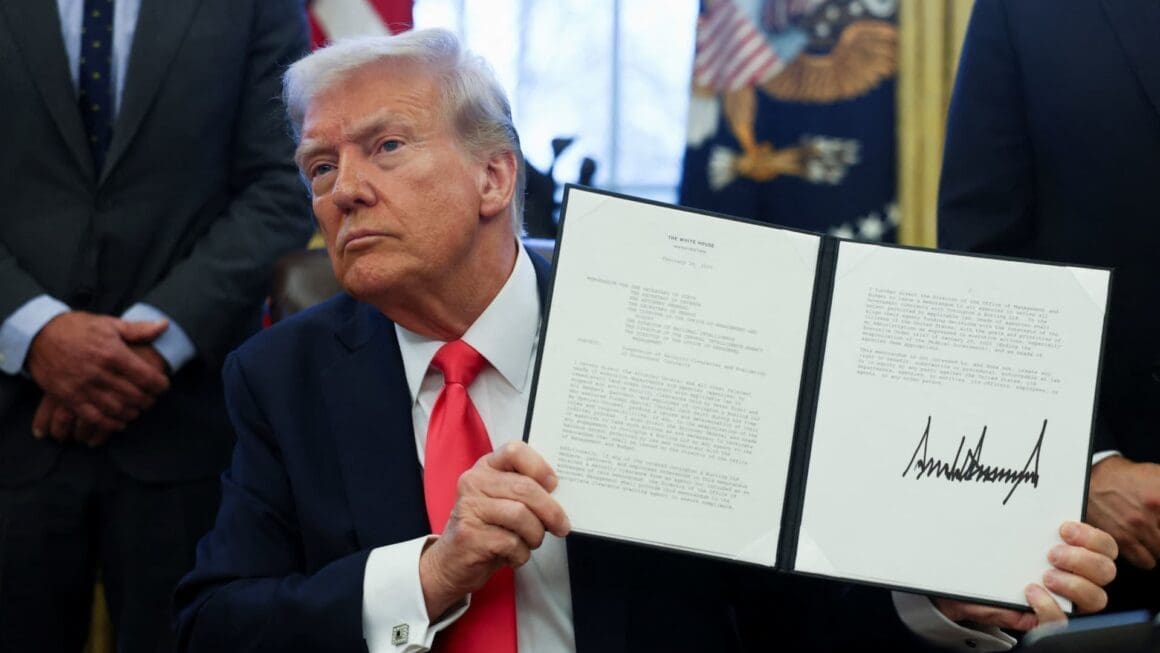President Donald Trump has intensified his efforts to scrutinize American colleges and the accrediting bodies that oversee them, as part of his ongoing campaign against “wokeness” and diversity initiatives in education. On Wednesday, Trump signed a series of executive actions targeting universities he considers liberal adversaries to his political agenda.
One of the orders demands stricter enforcement of a federal law requiring colleges to disclose financial ties with foreign sources. Another calls for a revision of accrediting bodies that decide whether colleges can accept federal financial aid awarded to students. Additionally, Trump instructed the Education Department to eliminate efforts promoting equity in discipline within the nation’s K-12 schools. Previous guidance from Democratic administrations advised against disproportionately punishing underrepresented minorities such as Black and Native American students. However, the current administration argues that these equity efforts lead to racial discrimination.
Concerns over colleges’ financial ties with foreign entities, particularly China and other nations with adversarial relations with the U.S., have long troubled Republicans. This issue came to the forefront during Trump’s first term and recently resurfaced amid the administration’s escalating conflict with Harvard University. The White House claims that action is necessary because Harvard and other colleges have frequently violated a federal disclosure law, which has seen inconsistent enforcement since its establishment in the 1980s. Known as Section 117 of the Higher Education Act, this law mandates colleges to report foreign gifts and contracts valued at $250,000 or more.
Last week, the Education Department requested records from Harvard regarding foreign financial connections over the past decade, accusing the institution of submitting “incomplete and inaccurate disclosures.” Trump’s administration is currently at odds with Harvard over the university’s handling of pro-Palestinian protests and its diversity, equity, and inclusion (DEI) efforts. In his executive order, Trump directs the Education Department and the attorney general to enhance enforcement of the law and take measures against colleges that breach it, including the potential cessation of federal funding. The administration’s objective is to “end the secrecy surrounding foreign funds in American educational institutions” and guard against “foreign exploitation.”
This move has garnered support from Republicans, including Rep. Tim Walberg of Michigan, the chair of the House Committee on Education and the Workforce. Walberg accused China of exploiting academic connections to steal research and “indoctrinate students.”
Another executive order targets accrediting bodies that establish standards colleges must meet to qualify for federal financial aid accepted by students. Trump’s campaign promise to overhaul this sector stems from his belief that it is “dominated by Marxist Maniacs and lunatics.” Although often overlooked as an obscure segment of college oversight, accreditors significantly influence college governance and curriculum standards. Trump’s executive order represents the opening salvo in a potentially lengthy battle to reform the accrediting industry.
Foremost among his priorities is removing DEI requirements imposed on colleges by accreditors. Some accreditors have already abandoned or ceased enforcing such standards amid Trump’s crackdown on DEI. His order calls for the government to suspend or terminate accreditors that practice discrimination under the guise of DEI, urging them to concentrate on the student outcomes of colleges and programs they monitor.
The president aims to facilitate competition for new accreditors against the 19 currently authorized to operate on behalf of the federal government. At present, new accreditors must endure a cumbersome process that customarily spans years to gain government recognition. Trump’s order insists that the process should be “transparent, efficient, and not unduly burdensome.”
“Instead of pushing schools to adopt a divisive DEI ideology, accreditors should focus on helping schools improve graduation rates and graduates’ performance in the labor market,” stated Education Secretary Linda McMahon.
The Societal Shift
- Impact on Education Policy: The stricter scrutiny of colleges and accreditors may reshape educational priorities, focusing more on student outcomes rather than DEI initiatives.
- Financial Transparency: Enhanced enforcement of financial disclosure laws could lead to increased transparency in foreign funding, impacting universities’ financial strategies and international collaborations.
- Equity in Education: The rollback of equity-focused discipline policies in K-12 schools might affect minority students’ educational experiences and outcomes.
- Accreditors’ Influence: Changes in accrediting standards could alter how colleges operate and are evaluated, potentially affecting federal financial aid eligibility.
- International Relations: Increased scrutiny of foreign financial ties might influence America’s diplomatic relations with countries involved, particularly those with contentious ties like China.
- University Autonomy: The administration’s actions may challenge universities’ independence, prompting debates over academic freedom and governmental intervention.











